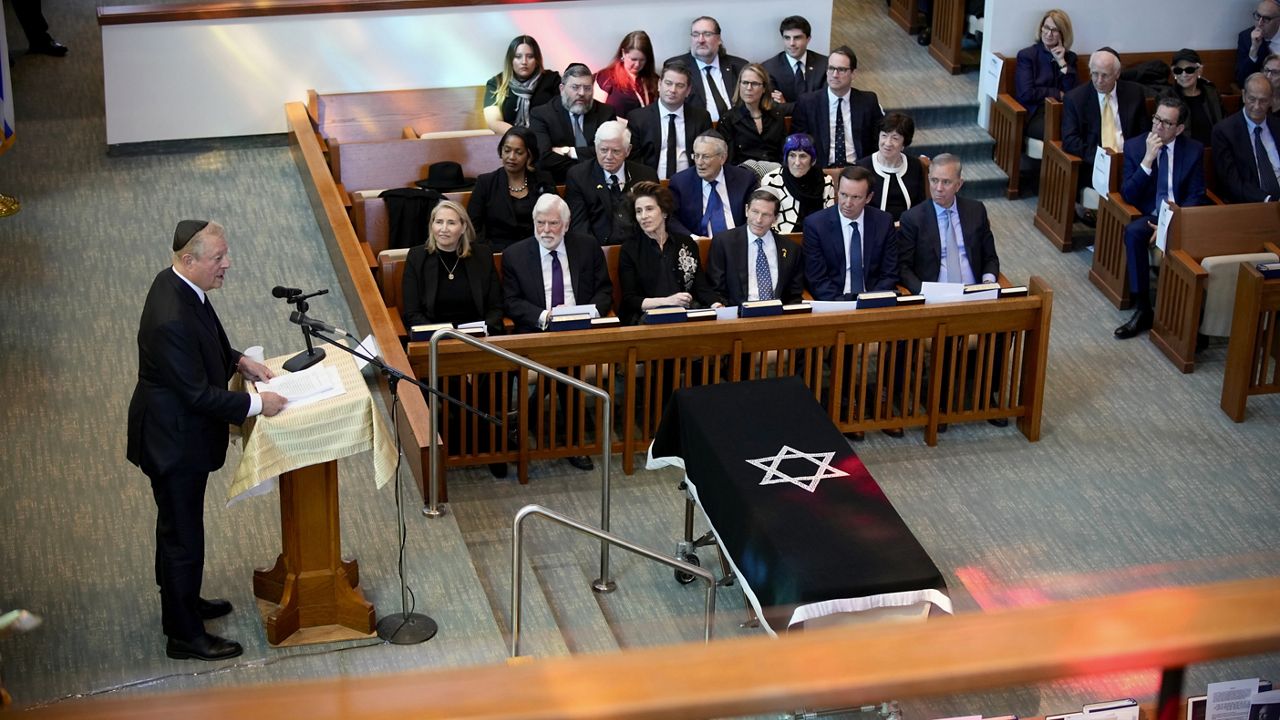Former and current U.S. senators were among those who remembered Joe Lieberman on Friday as a caring, impactful lawmaker who always put his country over politics.
Hundreds gathered at the Congregation Agudath Sholom in Lieberman’s hometown of Stamford, Connecticut, to say goodbye to the political titan who served in the U.S. Senate for four terms and nearly became vice president as Al Gore’s running mate in 2000.
What You Need To Know
- Former and current U.S. senators were among those who remembered Joe Lieberman on Friday as a caring, impactful lawmaker who always put his country over politics
- Hundreds gathered at the Congregation Agudath Sholom in Lieberman’s hometown of Stamford, Connecticut, to say goodbye to the political titan who served in the U.S. Senate for four terms and nearly became vice president as Al Gore’s running mate in 2000
- Lieberman, 82, died in New York on Wednesday due to complications from a fall, his family said
- Among those who spoke at his funeral were former Vice President Al Gore, current Connecticut Sens. Chris Murphy and Richard Blumenthal, former Sen. Chris Dodd and Connecticut Gov. Ned Lamont
Lieberman died in New York on Wednesday due to complications from a fall, his family said. He was 82.
“Joe Lieberman set out to change the world that he lived in,” said Sen. Chris Murphy, D-Conn., who now holds Liberman’s old Senate seat. “He did that.
“Joe Lieberman was a giant. He was an original. He was one of one. How lucky for Connecticut that he was one of ours. How lucky we were to have him.”
Former Sen. Chris Dodd, who served alongside Lieberman for 22 years as Connecticut’s senators and was friends with him for more than a half-century, said Lieberman’s “message and his example will carry on in my view.”
Murphy said Lieberman’s legacy in politics includes his efforts to combat climate change, which Murphy credited for laying the groundwork for the 2022 law passed by Congress that dedicated $369 billion to climate and clean energy programs. Lieberman also pushed for gay rights when few others were willing and introduced the legislation that led to the creation of the Department of Homeland Security following the 9/11 attacks, Murphy noted.
He also championed civil, voting and abortion rights, added Sen. Richard Blumenthal, D-Conn.
But Lieberman will also be remembered for being an independent thinker, something that made him unpopular with many in the Democratic Party.
Lieberman crossed party lines to support the U.S. invasion of Iraq in 2003. His position caused him to lose the Democratic primary when he sought reelection in 2006. But Lieberman retained his seat by running as an independent and winning the general election with the help of unaffiliated and Republican voters.
Later, Lieberman was a founding chairman of the centrist group No Labels. He also was on Republican Sen. John McCain’s shortlist for running mate in the 2008 presidential election.
Connecticut Gov. Ned Lamont, who defeated Lieberman in that 2006 Democratic primary only to lose to him in the general election, said Lieberman enjoyed going to a senior center in New Haven, Connecticut, and singing Frank Sinatra songs.
“And you can imagine his favorite was, ‘I Did It My Way,’” Lamont said. “He did it his way. He never quite fit in that Republican or Democratic box. I think maybe in an odd way, I helped liberate him because when he beat me … he was an independent. He’s been a proud independent ever since.”
Added Murphy: “It’s hard to be authentic in this business because there are these molds that you're supposed to be put in — Republican, Democrat, liberal, conservative, partisan, compromiser. Joe Lieberman was one of the few leaders who were strong enough, who were courageous enough to reject that easy categorization. It often outraged people.”
Gore spoke openly about the falling out he had with Lieberman over policy matters.
A Tennessee senator and Bill Clinton’s vice president before running for president, Gore said he chose Lieberman as his running mate because they shared similar views on many issues — and as a result, they became close friends.
“We laughed together, fought like hell together for what we wanted our country to be, prayed together, thought for a season we had won together,” Gore said, joking about their narrow loss to George W. Bush in a race that wasn’t decided until the Supreme Court ruled.
But they had a rift after the election “and went our separate ways,” Gore said.
“No matter how hard I tried or how hard Joe tried, we could not convince the other of the merit of our positions,” Gore said.
Gore said he grew “frustrated at Joe's stubbornness and disappointed that he was taking a path that I thought was wrong, and I know his disappointment and my turning away from him was surely just as profound.”
But Gore said they later mended their relationship.
“Both of us knew deep down that the strong foundation of our friendship and what we shared in common was so much larger and so much stronger than what was driving us apart in those years,” the former vice president said.
Gore said Americans can learn from Lieberman’s life “some critical lessons about how we might heal the rancor in our nation today.”
Blumenthal said he watched Lieberman disagree with people, but he “was never, ever disagreeable.”
“He had a gift for differing, but never dividing,” Blumenthal said. “And when he and I differed, we ended our conversations with a smile because he believed in listening. He truly believed in civility and listening. … He believed that every person has a story and every story is worthy of respect.”
Most of the speakers also spoke — and joked — about Lieberman’s devout faith. The first Jewish candidate on a presidential major-party ticket, Lieberman typically prioritized observing the Sabbath.
“Because political party conventions in Connecticut usually occurred on Saturdays … I am told that I not only nominated Joe for the Senate on one occasion but I also gave his acceptance speech,” Dodd said to laughter.
Murphy said Lieberman knew his religious devotion sometimes caused him to miss events and lose the chance to meet voters, but “he always believed it won him votes because people respected him for living his beliefs, for doing what he thought was right, for being authentic.”
Lieberman is survived by his wife, Hadassah, and four adult children.
“Your accomplishments on the global scale were so awesome, but somehow so to were your one-on-one interactions with everyone,” said his daughter Hana. “And, I mean, every single person you interacted with — the Capitol Police, the doorman, waiters, people from the neighborhood. Everyone knew they would be received with a warm smile and often accompanied by their name.”
Lieberman is being laid to rest at the Congregation Agudath Sholom’s cemetery, the same site where his parents are buried.
Ryan Chatelain - Digital Media Producer
Ryan Chatelain is a national news digital content producer for Spectrum News and is based in New York City. He has previously covered both news and sports for WFAN Sports Radio, CBS New York, Newsday, amNewYork and The Courier in his home state of Louisiana.








